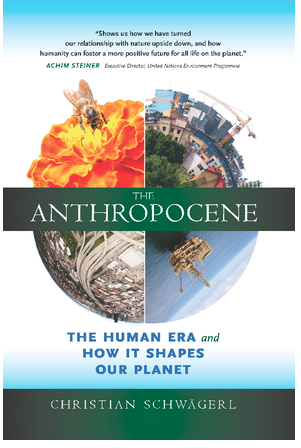 The term Anthropocene has become a popular in discussions on climate change. As we face the undeniable fact our planet is changing and humans are the cause, some scientists have entered into a new geological epoch called the Anthropocene.
The term Anthropocene has become a popular in discussions on climate change. As we face the undeniable fact our planet is changing and humans are the cause, some scientists have entered into a new geological epoch called the Anthropocene.
For the first time in our planet’s history, “humanity is the dominant influence on the planet’s ecosystem.”
Climate change does not have to be the end of it. In fact, author Christian Schwagerl in his book [amazon_link id=”0907791557″ target=”_blank” ]The Anthropocene: The Human Era and How It Shapes Our Planet[/amazon_link] explores our current planetary situation such as megacities and dwindling forests, as well as the science that will lead to a more positive future. He finds solutions to our global environmental crisis that balances “ecological sustainability, economic prosperity, political justice, and cultural vibrancy”.
Anthropocene is the age of man where our actions play out on the geological time scale.
So what exactly is the difference between the geological epochs of Holocene and Anthropocene?
It is a bit confusing. Since the end of the ice age, the Holocene Epoch began almost 12,000 years ago. It is our official current geological epoch. Sometimes Holocene and Anthropocene are used interchangeably, but they aren’t. There has been no official, universal acceptance that we have shifted to the Anthropocene Epoch, but scientific observations of our current planetary conditions and the grand effects of current human life would argue the shift has happened. All we have to do is look at nature.
The Smithsonian explains:
Have human beings permanently changed the planet? That seemingly simple question has sparked a new battle between geologists and environmental advocates over what to call the time period we live in.
According to the International Union of Geological Sciences (IUGS), the professional organization in charge of defining earth’s time scale, we are officially in the Holocene (“entirely recent”) epoch, which began 11,700 years ago after the last major ice age.
But that label is outdated, some experts say. They argue for “Anthropocene”—from anthropo, for “man,” and cene, for “new”—because human- kind has caused mass extinctions of plant and animal species, polluted the oceans and altered the atmosphere, among other lasting impacts.
Anthropocene has become an environmental buzzword ever since the atmospheric chemist and Nobel laureate Paul Crutzen popularized it in 2000. This year, the word has picked up velocity in elite science circles: It appeared in nearly 200 peer-reviewed articles, the publisher Elsevier has launched a new academic journal titled Anthropocene and the IUGS convened a group of scholars to decide by 2016 whether to officially declare that the Holocene is over and the Anthropocene has begun.
According to Schwargerl in the above video, Earth’s life span is about ten billion years. We are at the halfway point. In his book [amazon_link id=”0907791557″ target=”_blank” ]The Anthropocene: The Human Era and How It Shapes Our Planet[/amazon_link], we are given facts and solutions about this geological epoch.
In fact, Schwargerl believes we already have “the scientific, philosophical, spiritual and governmental tools needed to correct our current trajectory toward a positive and sustainable future”.
In The Anthropocene, environmental journalist Christian Schwägerl investigates our current ecological circumstances, and discovers something hopeful: that we already possess the scientific, philosophical, spiritual and governmental tools needed to correct our current trajectory toward a positive and sustainable future. Schwägerl assets, “The Anthropocene is more than the sum of the parts of environmental havoc. It can be the arena in which humanity decides to wisely integrate into the planet’s workings, enriching itself by its actions as a result. Smart cities, cultivated life-forms and landscapes with a human-induced biodiversity, are examples of how we can create a positive geological record. Human creativity, community spirit and conscious thought can lead to changes that might make our species look back at current behavior as sheer ecological barbarism. We can go from today’s crises to an enlightened planet.” Drawing on his own experiences and research as a journalist with rigorous scientific training, Schwägerl offers readers the means to envision and create realistic solutions to our current ecological crises.
Schwargerl proposes we move into a “completely regenerative economy, a closed cycle economy, in which the term waste no longer means anything”. Such ideas as compostable cars, biodegradable electronics, and plastics made from insect protein demonstrate how we can maintain a modern lifestyle and solve our environmental problems.
The environmental movement has been hurt by doomsday predictions. The negativity removes hope as the task seems to large. What we need is hope. What we need is inspiration. We can do this! Thank you Schwagerl for giving us this tangible hope! I have learned much from this book!
[amazon_enhanced asin=”0907791557″ /]
Yes, we are the somewhat reluctant shepherds of the planet. We are finally starting to realize the effects of our civilization on our environment. I’m hopeful that sources of renewable energy like wind and solar power will continue to play an important role in our path back to sustainability. We will eventually be able to live in harmony with our environment once again.